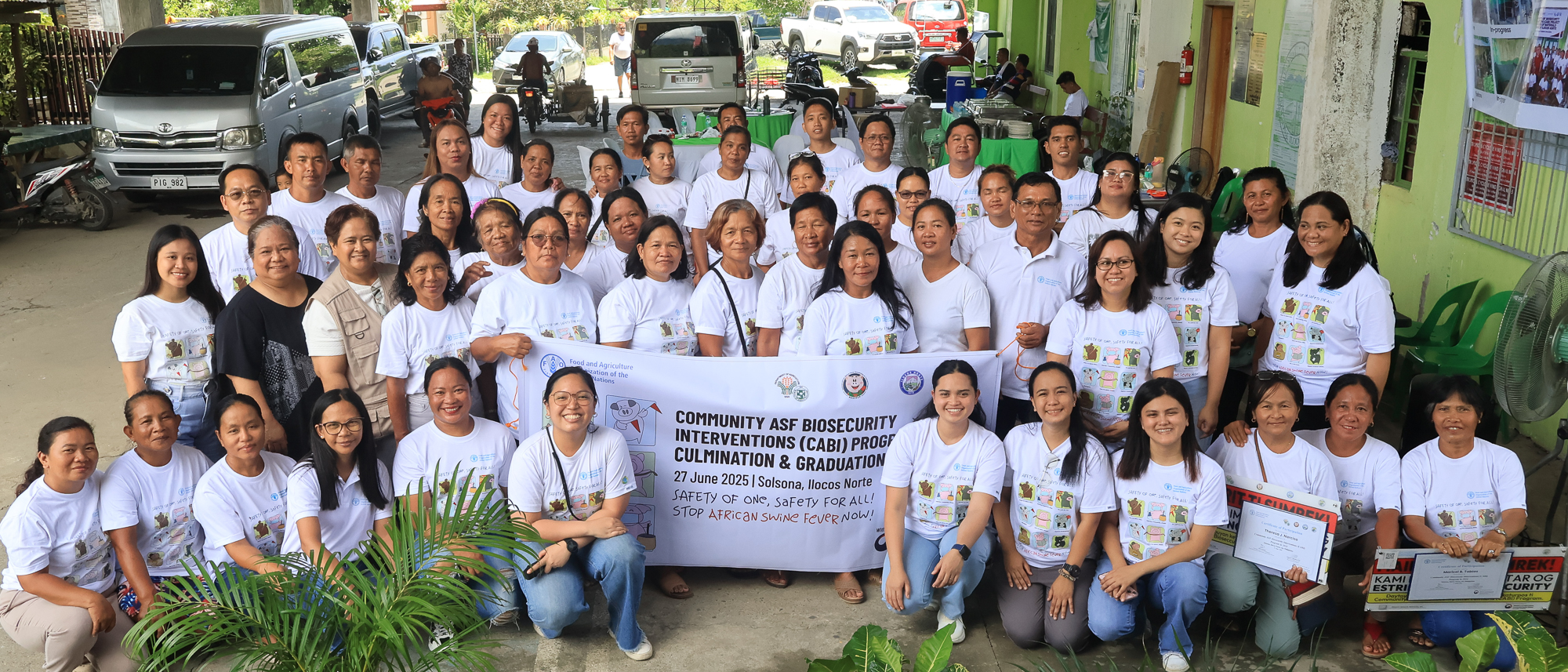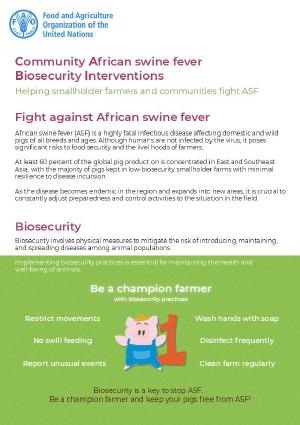177 pig farmers in the Philippines graduate as African swine fever biosecurity champions

©© FAO
Bais City and Solsona, the Philippines – Amid continued threats of African swine fever (ASF) in Southeast Asia, 177 smallholder pig farmers in the Philippines have become local biosecurity champions through FAO’s Community ASF Biosecurity Intervention (CABI) programme. Their graduation marks a critical milestone in the fight against ASF, demonstrating that empowering communities with practical, low-cost solutions can effectively reduce disease risks, protect livelihoods and rebuild rural pig production systems.
ASF continues to affect 20 countries in the Asia-Pacific region, posing severe threats to food security, rural livelihoods, and pig production systems. With the disease now considered endemic in parts of Southeast Asia and no treatment or commercially available vaccine, prevention through biosecurity remains the most effective line of defense.
Biosecurity encompasses simple, science-based measures that farmers can implement to reduce risks of disease entry and spread. Recognizing this, the FAO Emergency Centre for Transboundary Animal Diseases (ECTAD) launched the CABI programme to equip farmers with practical, low-cost biosecurity solutions that are contextualized, implemented and sustained by communities.
Piloted in the Philippines in 2022, the programme was conducted through a participatory approach involving consultations and partnerships with farmers, veterinarians, livestock officers, village volunteers and local governments. In 2024, CABI was expanded to Bais City, Negros Oriental, and Municipality of Solsona, Ilocos Norte, where 177 smallholder farmers committed to implement and invest in biosecurity to protect their animals and communities.
Graduates were celebrated at the ceremonies held in June, recognized not only for completing the programme, but for stepping into community’s biosecurity ambassadors who inspired others to take action. Notably, majority of the graduates were women, reaffirming their central roles in pig farming and disease prevention across the country.
“You have shown that simple, consistent and practical farm practices can make all the difference,” said FAO Representative in the Philippines Lionel Dabbadie. “Biosecurity is more than just materials, it is a mindset, a discipline and a shared responsibility. Even in the most vulnerable corners of the country, we can rise, rebuild and protect. Your stories and experiences will help guide and inspire others, expanding the reach of biosecurity and building stronger communities.”
Leveraging on CABI’s success, FAO piloted a simplified biosecurity champions training in 12 additional villages in Bais City and Solsona, reaching 315 more smallholder farmers who are neighbouring with CABI champions. Co-created with farmer-graduates, project teams and local animal health officers, the programme was grounded in real-life experiences and adapted to local languages, learning styles and farming conditions.
A key feature was peer-led learning. CABI graduates facilitated the sessions, shared personal stories, demonstrated practical skills and hosted farm visits. This approach deepened community understanding of biosecurity, reduced stigma around ASF and strengthened trust.
Initial results suggest that the biosecurity champions model is scalable for ASF prevention and adaptable to other animal health threats. By embedding knowledge and encouraging local ownership, the programme supports the development of resilient and sustainable pig farming systems in the Philippines.
“ASF devastated many rural livelihoods, but these farmers are leading the way back,” said Yooni Oh, Animal Production and Health Officer at FAO Regional Office for Asia and the Pacific. “Through this community-led biosecurity strategies, our champion farmers are building stronger, healthier, more resilient communities, which makes ASF prevention more sustainable from the grassroots level.”
FAO is now supporting the adaptation of the CABI model in other Member Nations in Southeast Asia, including Indonesia and Lao People’s Democratic Republic. These efforts align with the Association of Southeast Asian Nations (ASEAN) ASF prevention and control strategy and draw on the FAO’s regional guidelines for ASF prevention and control in smallholder pig farming in Asia.
FAO extends its sincere appreciation to the Ministry of Agriculture, Food and Rural Affairs (MAFRA) of the Republic of Korea for their financial support, and to all partners whose collaboration has made the programme possible.
Related publication
Contact
- Rindu Putri, FAO ECTAD Regional Communications Specialist, [email protected]
- Roxanne Bunayog, Project Communications Support, [email protected]

